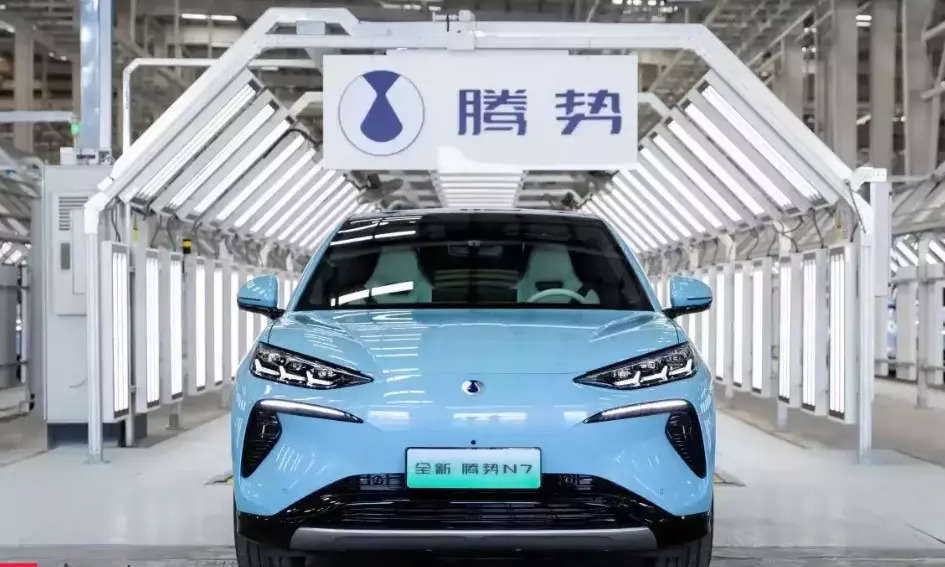
New Delhi: Chinese carmakers are now creating a new passage to India after being given the cold shoulder for over a couple of years now.
Today, the name of the game is alliance route which will allow these companies to get a foothold on the subcontinent. MG Motor, whose parent is SAIC of China, is now part of the JSW Group after being solo for nearly seven years. SAIC and JSW will jointly manufacture electric vehicles under a new entity, JSW MG Motor India, at a plant in Gujarat.
More recently, Leapmotor of China was in the news for an India entry where the investment details are expected to be announced soon. Stellantis, the merged entity of Groupe PSA and Fiat Chrysler Automobiles, had acquired a 20% stake in Leapmotor last October. There is now a global entity in place too, Leapmotor International (with Stellantis holding 51%), which will focus on overseas manufacturing of the Chinese automaker’s EVs.
Stellantis by itself came into being three years ago and is keen on growing its presence in India. Thus far, there is little to write home about the market share for either the Jeep or Citroen brands. The Japanese and Koreans have surged ahead while Stellantis continues to struggle even while its powertrain business at Hosur in Tamil Nadu has been doing well.
The company’s management has reiterated time and again that it is in India for the long haul even while the going has been exceptionally difficult. Competition from established brands like Maruti Suzuki and Hyundai has been stiff with local players such as Tata Motors and Mahindra & Mahindra pulling out all the stops too.
Economies of scale
The only way for Stellantis to stay relevant is to have economies of scale with a competitive costing structure. Leapmotor can end up being the proverbial knight in shining armour here where its EV range can hopefully generate the volumes and give a fillip to the overall business.
BYD is yet another Chinese auto brand which has been present in India for many years. It has been focusing on electric buses through a collaboration with Olectra Greentech, a subsidiary of the Hyderabad-based Megha Engineering. BYD has also entered the automobile arena with its e6 and Atto 3 followed by the more recent Seal. The Chinese auto brand has emerged as the latest threat to Tesla’s dominance in the global EV space and will, in all likelihood, race ahead and come out tops this year.
However, BYD is in dire need of a strong partner in India to boost its car business. There has been no news of any development happening here though speculation is rife within industry circles that the Adani group may just end up becoming a strong contender. “All this is really up in the air with no confirmation from either company. The only thing in common is a convergence of interests in cleaner fuels. Whether the Adanis will enter the car market with a Chinese partner remains a million dollar question,” says an industry executive.
Till a partner is found, there is little BYD can do for making fresh investments. MG Motor had to go through a long exercise before it joined hands with the JSW Group and this is something that BYD will also need to do.
There have also been talks of some Indian state governments ready to partner with BYD if this will mean attracting assured investments. The company has a plant near Chennai in Tamil Nadu and will be keen on accelerating the process of finding an ally once a new government is in place at the Centre.
Strong local ally
Does all this mean that India is now ready to allow Chinese investments into its auto domain going forward? For now, it looks as if one key criterion is having a strong local partner in place.
BYD, therefore, needs to find someone with the clout of a JSW Group which has partnered with MG Motor. Likewise, Leapmotor is in the Stellantis kitty which has been around for some time, and operating from two facilities in Tamil Nadu (for Citroen) and Maharashtra (Jeep).
“Perhaps the future will see a Citroen-branded EV that is a Leapmotor product. MG Motor was quick to realise that SAIC needed to be in the background since the Chinese association would have struck a jarring note in India,” says an auto industry veteran. The strategy worked and MG Motor, as the front face, tasted quick success with its Hector SUV and is now an established brand in this market.
It is still a million dollar question if other Chinese automakers will be inclined to follow this route for India. Before tensions broke out along the border with Chinese troops attacking Indian armed forces, Great Wall Motors was all set to step into the General Motors plant at Talegaon near Pune. The needless aggression from China only saw relations with India nosedive with the result that all investments were put on hold.
Great Wall Motors waited for nearly two years but when it became clear that nothing was going to change, the company wisely decided to park its investments in Brazil and Thailand. The GM plant finally went to Hyundai Motor India which will now use it to service the western region as well as overseas markets.
Right now, China is the clear leader in electric cars where its prowess once again came to the fore at the Beijing Auto Show. Beyond its traditional carmakers, smartphone makers like Xiaomi have entered the EV arena and are determined to do well here. The growing strength of the Chinese has caused a lot of anxiety in Europe and the US since it poses a direct threat to their own home-grown brands like Volkswagen, Mercedes, General Motors and Ford.
EV policy
For India, its policymakers have embraced electric as the best solution going forward to combat vehicle emissions. Local manufacturers like Tata Motors and Mahindra & Mahindra have already set the ball rolling in response along with MNCs like Hyundai and MG Motor. The Centre also unveiled its EV policy recently with an intention to woo Tesla but its CEO, Elon Musk, is clearly not interested, at least for the time being, with China being the priority.
China is miles ahead of the rest of the world in EVs. The country has also made known its global ambitions in this space with Latin America, ASEAN and Europe being on its agenda. Some of its manufacturers are also keen on shipping out their cars from facilities in Mexico to the US.
Even while the West is outraged at the Chinese invasion, customers really don’t seem to care since they get the best features at a more competitive price than their own home-grown models. If India were to allow Chinese automakers to set up shop here with its own set of tough entry barriers, the message ought to be sent out loud and clear that local suppliers will be given preference.
Will the Chinese in turn be as interested? Right now, there is really no love lost between India and China. Even if relations improve in the near future, the Chinese will ensure that they go all out to make a mark in the electric arena. Their expertise in costing and economies of scale along with competencies built over the years will hold them in good stead. To that extent, the Chinese will be a huge threat and India will, therefore, need to tread carefully in the event it chooses to open its gates to them.
















